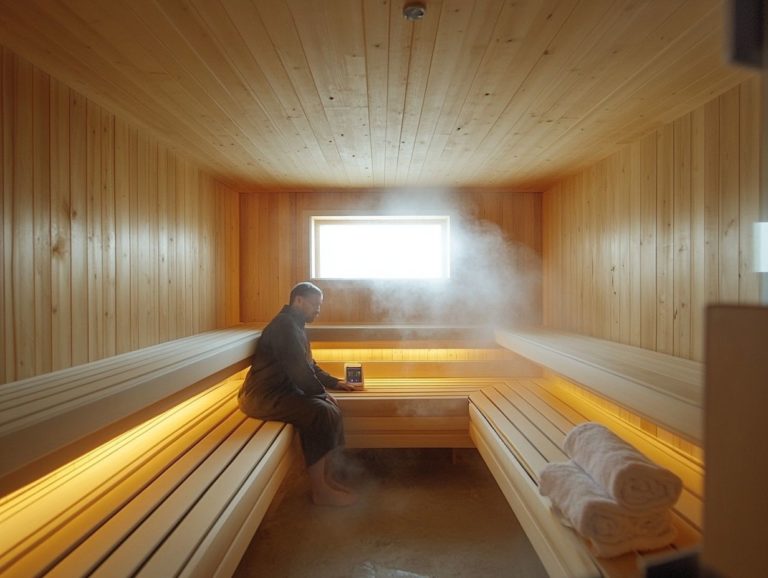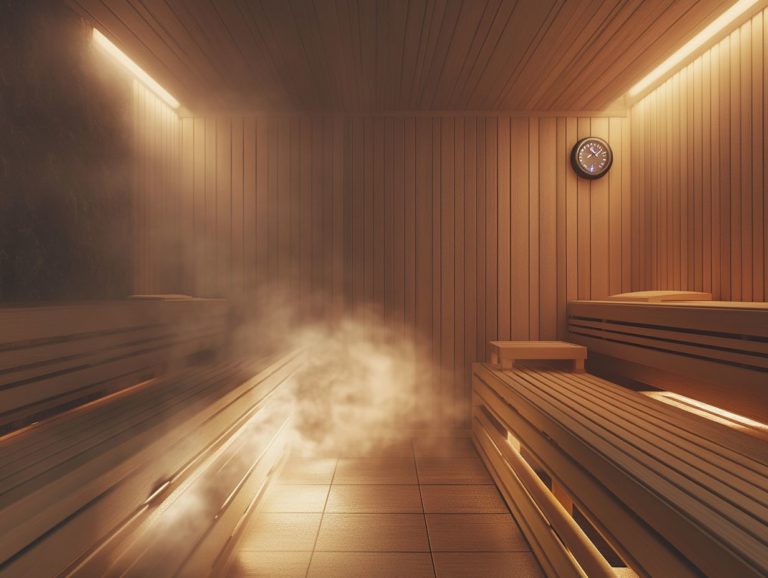Can Saunas Help with Respiratory Issues?
Saunas have long been revered for their relaxation and detoxification benefits. Recently, their influence on respiratory health has garnered increasing interest.
This article explores the connection between saunas and respiratory issues. It illuminates how these warm, inviting spaces can offer relief for various conditions.
Additionally, it addresses essential precautions for individuals with respiratory concerns. You ll find insights into alternative methods to support lung health.
Imagine integrating sauna sessions into your routine! This could elevate your breathing and enhance your overall well-being.
Contents
- Key Takeaways:
- Saunas and Respiratory Issues
- Benefits of Saunas for Respiratory Health
- Precautions for Using Saunas with Respiratory Issues
- Alternatives to Saunas for Respiratory Health
- Frequently Asked Questions
- Can Saunas Help with Respiratory Issues?
- How do saunas improve lung function?
- Can saunas reduce symptoms of asthma?
- Are there any risks associated with using a sauna for respiratory issues?
- How often should I use a sauna for respiratory benefits?
- Are there any other benefits of using a sauna for respiratory issues?
Key Takeaways:

- Experience the benefits of saunas to improve lung function and reduce symptoms of respiratory conditions.
- Manage specific respiratory conditions like asthma and chronic bronchitis with sauna use.
- Always talk to your doctor before starting sauna sessions to ensure they re right for you. Stay hydrated and limit your time in the heat.
Saunas and Respiratory Issues
Saunas are celebrated for their remarkable benefits to respiratory health. They tackle a spectrum of conditions, including serious lung conditions like asthma.
The application of heat therapy in traditional and infrared saunas can greatly enhance your lung health. It improves lung capacity, nasal airflow, and boosts your immune response, while promoting detoxification. Additionally, you may wonder if saunas can help with sleep issues, as their benefits extend beyond just respiratory health.
As you explore the relationship between sauna use and respiratory issues, you’ll discover that regular sessions can significantly reduce inflammation and promote overall wellness. Additionally, understanding how saunas impact your mental health makes them an appealing choice for anyone grappling with various respiratory conditions.
Understanding the Connection
The connection between sauna use and respiratory health lies in how heat therapy enhances lung capacity and improves nasal airflow. This can be particularly beneficial for those with chronic respiratory diseases.
By immersing yourself in a warm, humid environment, sauna therapy helps relax your airway muscles, making it easier for you to breathe.
This increase in airflow promotes better oxygen exchange in your lungs. This is a vital benefit for anyone dealing with conditions like asthma or serious lung conditions. Additionally, it’s important to consider sauna safety for skin conditions to maximize your wellness experience.
The heat also encourages your body to circulate blood more efficiently. This can potentially reduce inflammation and mucus production, leading to noticeable symptom relief. Regular sauna sessions support your respiratory health and enhance your overall well-being, unlocking additional benefits for lung function and respiratory comfort. In particular, how saunas can help alleviate anxiety is an important aspect to consider.
Benefits of Saunas for Respiratory Health
The benefits of saunas for your respiratory health go beyond relaxation. They offer a multitude of advantages, including improved breathing and activation of your immune response.
How Saunas Can Help with Specific Conditions

Saunas provide remarkable benefits for specific respiratory conditions, such as asthma and serious lung conditions like chronic obstructive pulmonary disease (COPD). They offer symptomatic relief and foster overall respiratory wellness.
The heat from the sauna works wonders by opening your airways, making it easier for you to breathe. If you have asthma, this warmth can potentially minimize bronchospasm, often triggered by shifts in temperature and humidity.
For those managing serious lung conditions, sauna sessions can help clear mucus buildup, improving lung function.
The boost in blood circulation and the relaxation that comes with sauna use can lead to reduced inflammation and an improved immune response. Additionally, exploring whether saunas can help with stress relief contributes to better lung health and a greater sense of well-being.
Precautions for Using Saunas with Respiratory Issues
While saunas can provide a range of benefits for your respiratory health, it s essential to take certain precautions. Be mindful of potential risks, such as dehydration and temperature fluctuations, which could exacerbate chronic respiratory conditions.
Have you ever wondered how saunas can improve your breathing? Consider adding sauna sessions to your wellness routine. You might be surprised at the difference it makes!
What to Consider Before Using a Sauna
Before diving into sauna sessions, consider your respiratory health. Check your tolerance for heat, hydration levels, and any existing conditions like chronic bronchitis.
Taking these factors into account ensures a safe experience and amplifies the therapeutic and health benefits that saunas can offer. For instance, improving sleep quality with saunas is one of the many advantages you can gain. A quick chat with your doctor can make your sauna experience even safer and more enjoyable!
Familiarize yourself with recommended sauna practices like optimal session durations and temperature settings to enhance your experience and ensure sauna safety. Don t overlook hydration; it s vital for maintaining your electrolyte balance and overall well-being.
By embracing these guidelines, you ll set the stage for a more enjoyable and beneficial sauna session.
Alternatives to Saunas for Respiratory Health
If saunas aren t an option for you, explore alternative methods like steam rooms to boost your respiratory health. Steam rooms, cold exposure therapies, and various wellness practices can effectively enhance lung function and alleviate respiratory symptoms.
Other Methods for Improving Respiratory Health

Besides sauna therapy, consider other effective methods for enhancing your respiratory health, such as steam rooms, breathing exercises, and cold exposure. Each of these practices can significantly improve nasal airflow and support your respiratory system.
Steam rooms create a humid environment that can alleviate congestion and promote mucus clearance, making breathing feel like a breeze. Breathing exercises focus on strengthening your lungs and improving lung capacity, which is especially beneficial for anyone grappling with chronic conditions. Additionally, the link between saunas and better sleep patterns suggests that incorporating heat therapy may enhance overall well-being. Cold exposure has been shown to enhance circulation, potentially providing relief and reducing inflammation in the airways.
By seamlessly integrating these methods with sauna therapy, you can establish a holistic approach to respiratory wellness that may elevate your overall health.
Frequently Asked Questions
Can Saunas Help with Respiratory Issues?
Yes, saunas can help with respiratory issues by improving lung function and reducing symptoms of conditions such as asthma and bronchitis.
How do saunas improve lung function?
The heat and steam in saunas can help open up airways, allowing for better oxygen flow and improved lung function.
Can saunas reduce symptoms of asthma?

Yes, regular sauna sessions have been shown to reduce symptoms of asthma, such as wheezing and shortness of breath, by opening up airways and reducing inflammation in the lungs.
Are there any risks associated with using a sauna for respiratory issues?
While saunas can be beneficial for respiratory issues, they may not be suitable for everyone. People with certain respiratory conditions, such as chronic obstructive pulmonary disease (COPD), should consult with a doctor before using a sauna.
How often should I use a sauna for respiratory benefits?
The frequency of sauna use for respiratory benefits may vary depending on the individual’s condition. It is best to consult with a doctor for personalized recommendations. Generally, 2-3 sauna sessions per week may be beneficial.
Are there any other benefits of using a sauna for respiratory issues?
Aside from improving lung function and reducing symptoms, saunas can also help clear congestion in the sinuses and improve overall respiratory health by promoting detoxification through sweating.






